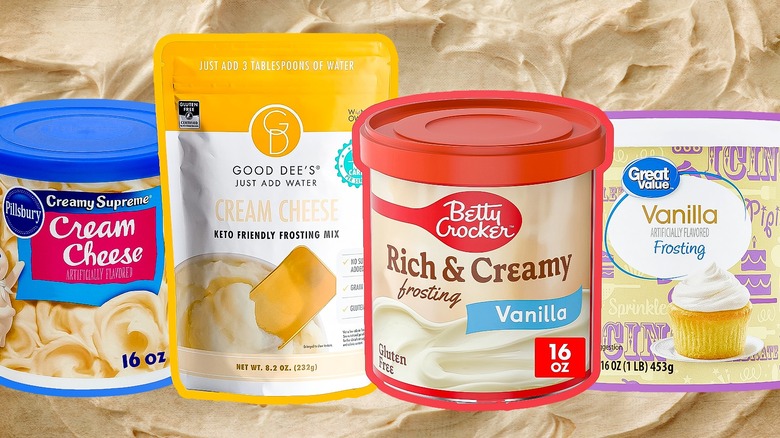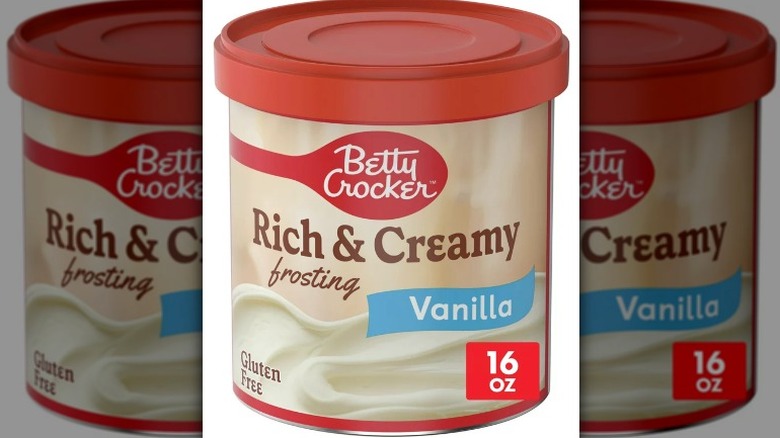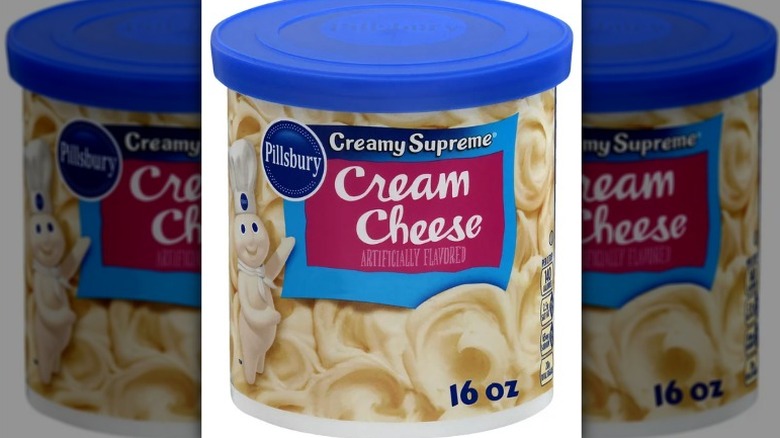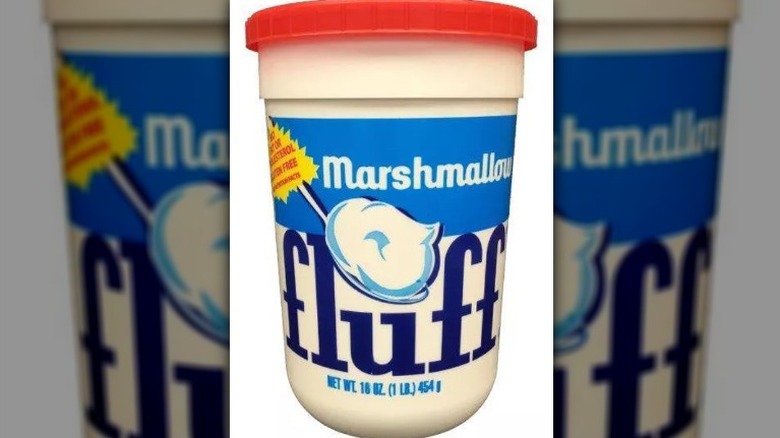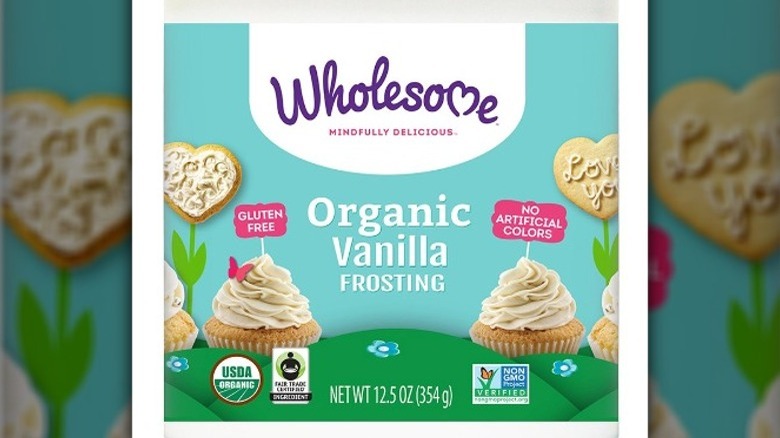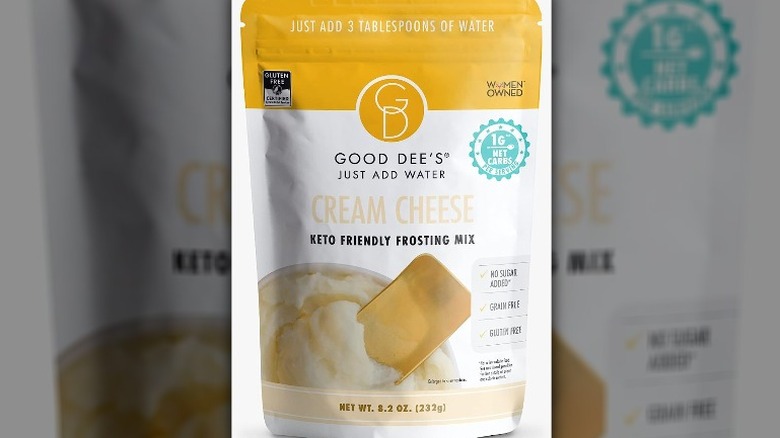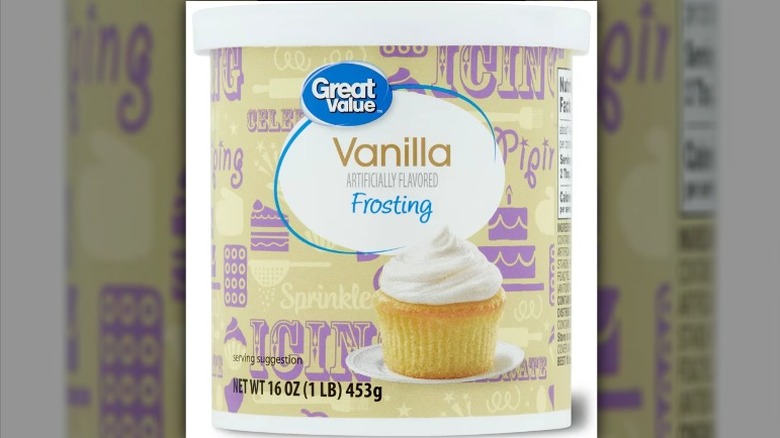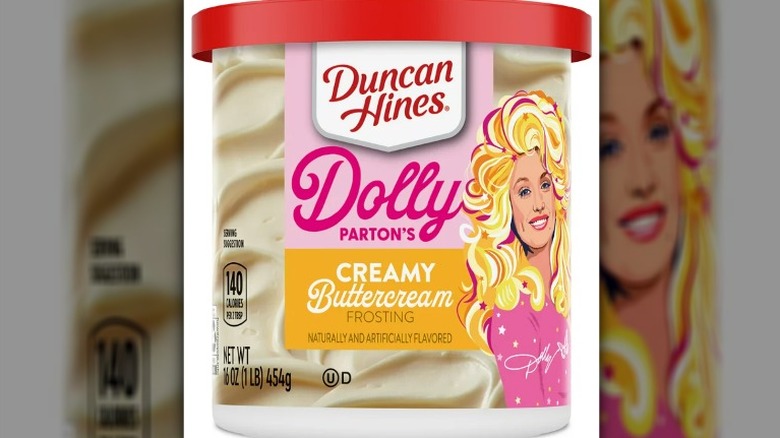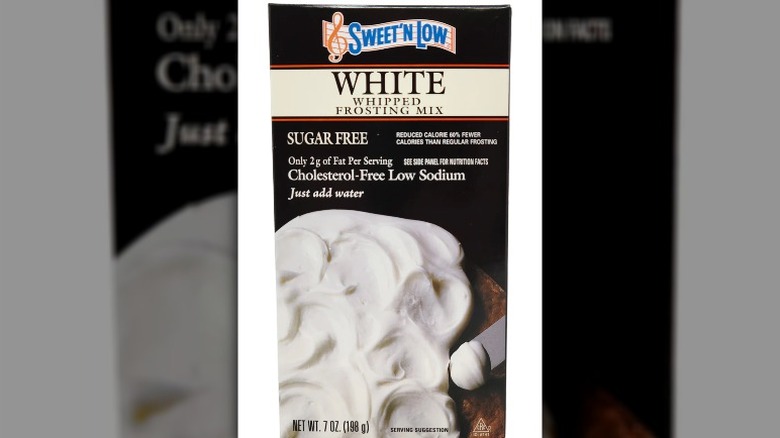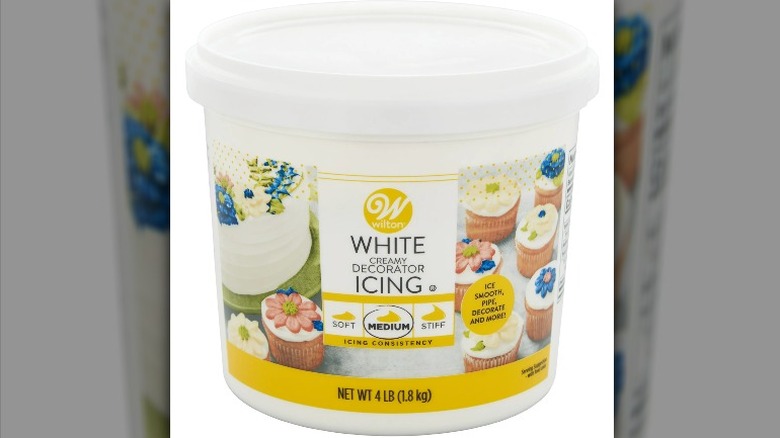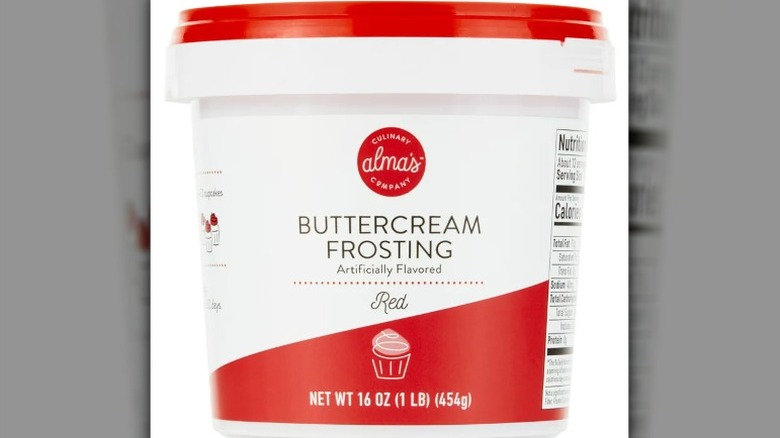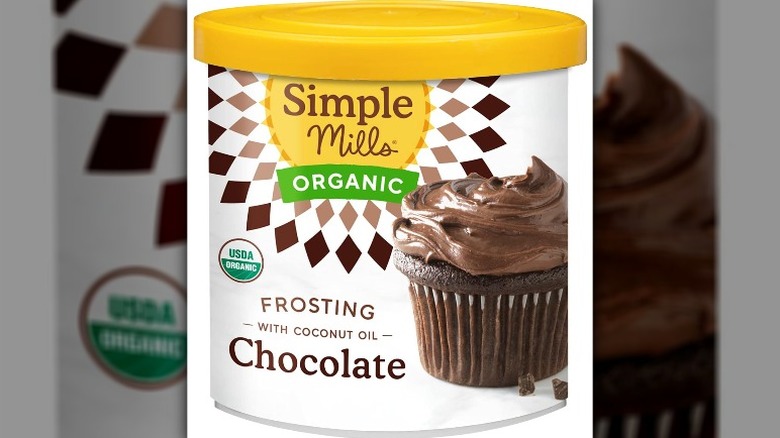The 11 Unhealthiest Store-Bought Frosting Brands
We may receive a commission on purchases made from links.
What is it exactly that makes a cake so delicious? Is it the pillowy, delicate, moist crumb? Is it the filling you use? Perhaps, it's the toppings you use on your cake, which adorn your dessert with a creamy covering and eye-popping confectionery. In reality, the best cakes have a well-balanced combination of all three — but if you pressed us on it, we'd say that what really makes cakes exceptional is frosting.
Frosting doesn't belong on all cakes, but when it's used well, it's sensational. A whipped, spreadable mixture, frosting differs from regular icing by using butter or cream as one of its primary ingredients. This fat content, combined with its density, give frosting a richness that elevates baked goods to the next level.
But while we're pretty sure that no one's deluding themselves into thinking that frosting is a healthy food, it can pack way more of a punch than you think. Although with homemade frosting, you can control what goes into it, store-bought frosting is a different story. Many well-known frosting brands are jam-packed with ingredients that might surprise you. Some even have additives and preservatives that you may rather leave off your cake entirely. But if you don't have time to scour the ingredient lists of all of the frosting brands in the store, don't fret. We've got the ones to watch out for right here.
1. Betty Crocker
Do baking brands get more iconic than Betty Crocker? We don't think so. The food company has been around since 1921 when the titular character was conceived as a way to add a more personable touch. Since then, the company has been catering to a world hungry for quality bakes and tasty frostings.
Troublingly, though, Betty Crocker frostings use a host of ingredients that might raise some eyebrows. Even though some of its frostings are marketed as "gluten-free" – which might imply that they're healthier than others — these products are abundant in additives that aren't exactly healthy. One key ingredient in Betty Crocker's Gluten-Free Vanilla Frosting is high fructose corn syrup. This contentious ingredient has been linked to several chronic conditions when consumed in higher quantities, like diabetes, obesity, fatty liver disease, and inflammation, per Healthline.
In addition, this frosting is full of additives that improve its texture and lifespan — some of which can have unintended side effects for some people. One key ingredient in Betty Crocker frostings is potassium sorbate. While this preservative is generally used in small quantities and is generally safe to consume, it also has the potential to prompt an allergic response in certain individuals, says Livestrong.
2. Pillsbury
Think Pillsbury and you likely think of the Doughboy. This friendly-looking mascot has been pleasing customers and selling baking products since the 1960s, and we're pretty sure that it's responsible for a fair few Pillsbury frosting purchases, too. It's just that cute.
But even the Pillsbury Doughboy couldn't convince us that the brand's frosting is healthy. Part of what makes frosting so delicious is the high sugar and fat content in each serving, but Pillsbury's products really take the cake, so to speak. In one serving of the Pillsbury Creamy Supreme Cream Cheese Frosting (which is approximately two tablespoons), there's around one-eighth of your saturated fat allowance for the day and 20 grams of added sugar.
It's these added sugars which make this frosting so questionable. It's recommended by the American Heart Association that women should consume no more than 25 grams of added sugar each day. The allowance for men is slightly higher, at 36 grams per day. With this in mind, a single serving of Pillsbury's frosting could account for up to 80% of your recommended daily value. We're all for ease and convenience, but honestly, we'd recommend making your own cream cheese frosting instead of going for this one. It'll be way more satisfying, and you can choose how much sugar you're putting into it.
3. Marshmallow Fluff
Honestly, we love living in the modern era, guys. Sure, there are certain things that we would probably change about it, but it's also a time when you can buy Marshmallow Fluff Frosting, a variation on the classic Marshmallow Fluff spread that has been around since the early 20th century. But just because you can, doesn't mean you should.
Certain things look quite good about Marshmallow Fluff Frosting at first glance: It's way lower in sugar than a lot of other store-bought frostings, it doesn't contain saturated fat or trans fats, and it has fairly minimal calories in every two tablespoons. But that's where the positives end. While it has less sugar, the sweetness it does have is partially supplied by corn syrup, which is far from nutritious. Furthermore, its ingredients list doesn't really inspire a huge amount of confidence by simply listing "artificial flavor" as an addition. Care to tell us more?
While we're pretty sure that no one's eating frosting in the hope that it's full of vitamins and minerals, if you're expecting some hidden surprises here, you'll be left disappointed. Marshmallow Fluff's frosting appears to have no real nutritional value or added nutrients.
4. Wholesome
We can understand why the inclusion of this brand here might raise a few eyebrows. After all, the fair trade-focused brand Wholesome has a lot to be proud of, in terms of its focus on creating products with quality organic ingredients and choosing suppliers that support local communities.
But here's the thing: We just can't ignore those sugar levels. Once you take a closer look at Wholesome's Organic Vanilla Frosting, we're not sure you'll be able to either. In each serving of its frosting, there is a whopping 22 grams of sugar. All of those grams come in the form of added sugar.
That's a significant portion of your daily allowance in just two tablespoons. That amount is amongst the store-bought frostings available today. Although you might take comfort in the fact that this sugar is coming from an organic, reputable source, your body doesn't necessarily recognize whether sugar is organic or not. This type of sugar has a similar nutritional value and impact as an inorganic sweetener. Where this brand does excel, though, is in its ethics. We're happy to advocate for those.
5. Good Dee's
There are a lot of things to admire about Good Dee's baking products. The brand is clearly well-aware that in this day and age, consumers require a range of items for specific dietary needs, and there are a lot of folks out there who have a hankering for baked goods without high amounts of carbohydrates. This emphasis on low-carb cooking makes its products an excellent choice for folks who have diabetes or are following a ketogenic diet.
But this brand's food has to get its flavor from somewhere. In Good Dee's frosting, fat does the trick. Good Dee's Cream Cheese Keto Friendly Frosting Mix is particularly high in saturated fat, with almost 20% of your recommended daily allowance per two tablespoon-serving of frosting. Consuming high levels of saturated fat as part of a low-carb diet may not be a huge issue for cholesterol in the short term, as a study published in The American Journal of Clinical Nutrition says. But if you're eating this frosting as part of a regular-carb diet, we can't say the same.
As well as this, Good Dee's gets its sweetness not from sugar, but from a low-calorie sweetener called allulose. While allulose is generally pretty safe, some folks may find it harder to stomach. "One side effect that people tend to see is some gastrointestinal discomfort, like maybe some bloating, or some issues going to the bathroom," registered dietitian Anthony DiMarino told WebMD.
6. Great Value
Everyone loves things that are of great value. Walmart not only understands this but took action on it in a pretty clear way. Thus, its Great Value brand was born, with hundreds of everyday products sold at affordable prices. There are a lot of baking items that are part of the Great Value brand. Among the low-cost flour, butter, honey, and syrup, is its Vanilla Frosting.
Unfortunately, it's not the healthiest frosting. Although this product is cheaper than others and seems to be well-liked by customers, it's also not the healthiest out there. Great Value Vanilla Frosting is a calorie-dense option, with 140 calories per serving. Given that a serving size is two tablespoons, that's 70 calories in just one spoonful of frosting (a pretty sizable amount). Even more concerning is that the ingredients it uses clearly don't have much in the way of nutritional value. There are no vitamins or minerals in the product at all.
This frosting's somewhat lengthy list of additives leaves a lot to be desired. One such addition that we're not super excited about is titanium dioxide. This ingredient, also known as E171, has recently been banned in the European Union, due to question marks about its ability to raise the risk of developing cancer, via WebMD.
7. Duncan Hines
This one broke our heart — and not for the reasons you might expect. We don't necessarily have any brand loyalty to Duncan Hines. But honestly, any food company that makes a cake frosting featuring the total legend that is Dolly Parton has our instant respect and admiration.
But while Duncan Hines Dolly Parton's Favorite Creamy Buttercream Flavored Cake Frosting might save you from working 9 to 5 to produce your own cake topping, what it won't save you from is consuming a large amount of sugar. There's an extraordinary amount of sugar in this frosting, clocking in at 22 grams per serving — and all of this is added sugar. That's potentially a huge proportion of your recommended daily limit. Plus, there's no fiber to be seen in this frosting. Fiber is known for not causing blood sugar spikes, and sugar is known for doing the opposite, according to the Centers for Disease Control and Prevention. This means that this frosting could potentially cause a large spike in blood glucose.
But sugar isn't the only thing in this diva-inspired frosting. Its ingredient list is lengthy and artificial. There are even several food colorings including Red 40 and Yellow 5. Both of these additives are common food dyes, but they also carry with them a potential allergy risk. Consuming food dyes like Yellow 5 may also result in hyperactivity or irritability, via Healthline.
8. Sweet'n Low
Nowadays, low-calorie sweeteners are everywhere, but Sweet'n Low arguably got there first. Its sachets of sugar-like substances have been a constant presence at diners and restaurants for decades. The company was smart enough to expand its offering into a range of food products that need the sweet touch without using sugar, such as its Sweet'n Low White Frosting.
But the very thing that makes Sweet'n Low products so sweet is also what you should be watching out for. Sure, Sweet'n Low White Frosting is sugar-free, but it also contains maltodextrin and aspartame. Neither of these ingredients is without controversy. Maltodextrin is a super-refined carbohydrate product, and while this processing gives it its intense sweetness, it also means that it has a somewhat questionable impact on the gut, altering your natural gut bacteria balance. Unhealthy gut bacteria can have a range of bad effects, increasing your risk of getting sick from salmonella and potentially contributing to inflammatory bowel disease, per WebMD.
Sweet'n Low's other sweet ingredient, aspartame, is also a little troubling. In June 2023, it was announced that the sweetener is set to be declared as a potential carcinogen by the World Health Organization.
9. Wilton
Wilton has been around since 1929. In that time, the company has turned from a relatively small business to a multinational food company specializing in baking products. As the brand was started by an expert candy maker, it's fair to assume that the company prioritizes quality and excellence in its food output. However, that doesn't necessarily translate to its product's nutrition, which is somewhat lacking.
This is pretty clear to see in Wilton's Creamy White Decorator Frosting. This product, which comes in a large tub, has one of the highest calorie counts per serving of all the commercially-produced frostings out there, with 150 calories in every two tablespoons. A large proportion of these calories come from saturated fat.
Keeping an eye on your saturated fat intake is vital, as having too much of this can cause an increase in your cholesterol levels. Having higher cholesterol can raise the risk of certain chronic health conditions, explains Harvard Health Publishing. This product is also pretty high in sugar, with 17 grams of added sugar per portion. However, it doesn't seem to contain any real nutritional value, with no protein and no indication of vitamins and minerals.
10. Alma's
One thing you can rely on with store-bought frosting is its ability to give your cakes a serious visual impact. Food company Alma's clearly understands this. Its Red Buttercream Frosting is a vibrant shade of scarlet, promising to give your cake that wow factor when you place it on the table.
But where it gets that color from — and the nutrition of the frosting — is another story. Alma's Red Buttercream Frosting is both artificially flavored and colored, with food dyes Red 3, Red 40, and Yellow 5 used to give it its bright red hue. But we're less concerned about the colorings used, and more concerned with the sugars and fats present in this frosting.
Alma's Red Buttercream Frosting is wildly high in calories, with 190 calories in each serving, and much of this comes from fat and sugar. There are 11 grams of fat in every two tablespoons of the cake topper. Around 5 grams of that is saturated fat. On the sugar front, things look pretty astronomical, too. There are 22 grams of carbohydrates per serving, and 20 of these grams are made up of added sugars, promising not only to send your blood sugar skyrocketing but to put your teeth on edge, too.
11. Simple Mills
We've gotta say, we're a big fan of the mission behind Simple Mills. Since 2012 the brand has aimed to make foods that are delicious, intentional, and lacking artificial ingredients. With some of its food products, it hits the mark — but unfortunately, we're slightly less convinced by its frosting.
To be clear, there are loads of things about its frosting products that we think look great: They're made of primarily organic ingredients, with no artificial additives, colorings, or flavorings, and they're comparatively pretty low in sugar. But where things unravel somewhat is with its saturated fat content.
Per serving, Simple Mills Organic Frosting has a super high level of saturated fat. At 7 grams of saturated fat in every two tablespoons, it's a significant amount. Now, we don't know about you, but that does seem pretty high for a food item that makes up a pretty small amount of your daily menu.
